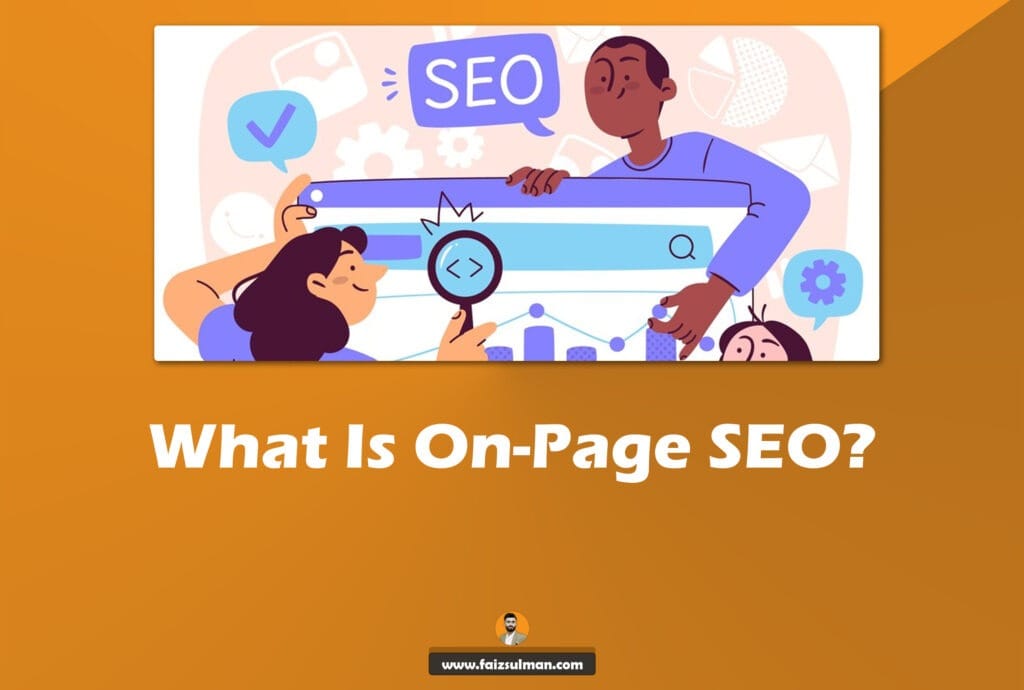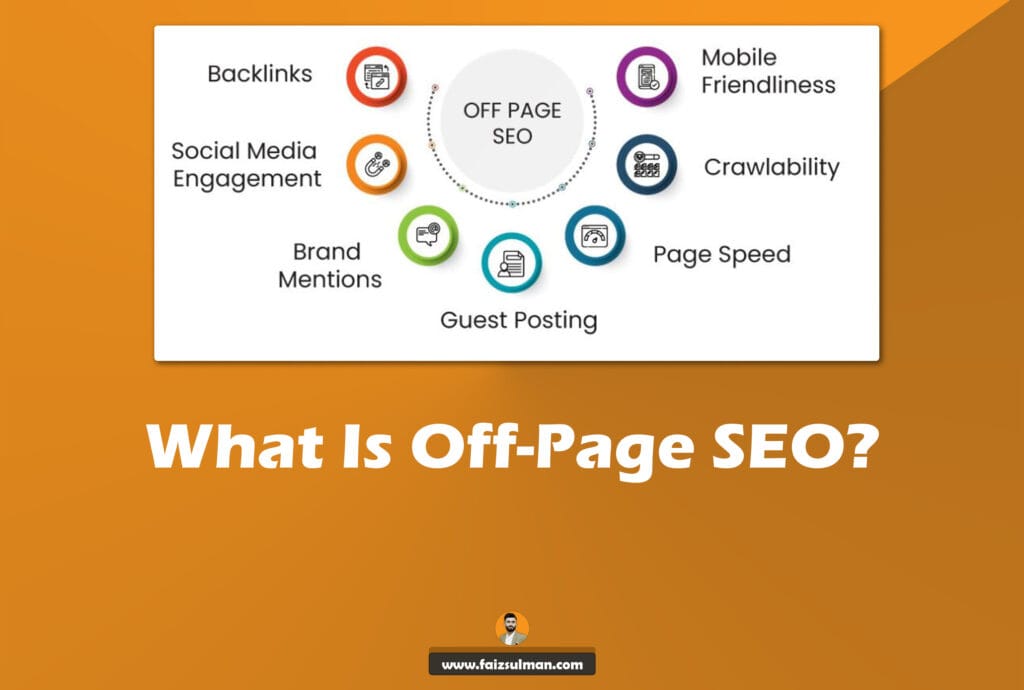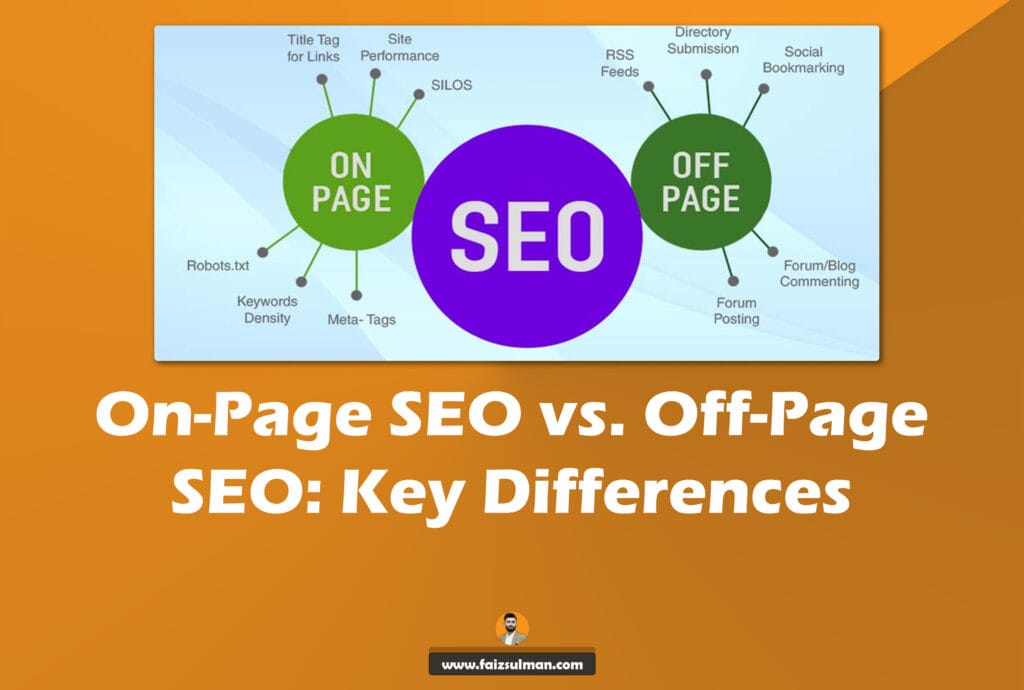On-Page SEO vs Off-Page SEO: Key Differences Explained


Introduction to SEO: On-Page vs. Off-Page SEO
In the world of digital marketing, the term SEO (Search Engine Optimization) is key to boosting your online presence. But when you dive deeper into SEO, you’ll encounter two crucial categories: On-Page SEO and Off-Page SEO. Each plays a unique role in helping your website rank higher on search engine results pages (SERPs). While both work toward the same goal, they operate in different ways.
Let’s break down the key differences between On-Page and Off-Page SEO and explore how you can use both strategies to improve your site’s visibility.
What Is SEO?
SEO is a collection of techniques designed to help your website rank higher in search engine results. It involves optimizing various aspects of your site to make it more attractive to search engines like Google, Bing, or Yahoo. A well-optimized website will not only rank higher but also attract more visitors organically.
The Importance of SEO for Your Website
Without SEO, your website is like a book on a shelf with no title on the spine. It may be full of valuable content, but no one knows it exists. SEO helps search engines understand your content, making it easier for them to match it to user queries. In essence, SEO is your ticket to driving organic traffic.
What Is On-Page SEO?

On-Page SEO Definition
On-Page SEO refers to the optimization of individual pages on your website. This involves optimizing the content and the HTML source code of a page to make it more search-engine friendly. Everything you can control and adjust on your website falls under On-Page SEO.
Why On-Page SEO Is Crucial
On-Page SEO is crucial because it directly influences how search engines interpret your content. By optimizing the core elements of your site, you enhance the chances of ranking for targeted keywords, which ultimately drives more traffic to your website.
Key Elements of On-Page SEO
High-Quality Content
Content is king in SEO. High-quality, informative, and engaging content is essential for On-Page SEO. Your content should provide real value to users while incorporating relevant keywords.
Meta Tags and Descriptions
Meta tags, such as the title and description, are key to improving your visibility on search engines. They give search engines and users a brief idea of what your page is about.
URL Structure
Having clean, descriptive URLs helps both search engines and users understand the content of your page. Aim for short, keyword-rich URLs.
Internal Linking
Internal links guide users and search engines through your site. They help distribute authority across your website and make it easier for search engines to crawl your pages.
Image Optimization
Images enhance your content, but they also need to be optimized. Using appropriate alt text and compressing image sizes ensures they don’t slow down your website.
Mobile Friendliness
Google now uses mobile-first indexing, meaning it prioritizes mobile versions of sites when determining rankings. Ensuring your website is mobile-friendly is no longer optional—it’s essential.
Website Speed and Performance
A slow website can negatively impact both user experience and rankings. Optimizing your website for speed is critical for good SEO performance.
What Is Off-Page SEO?

Off-Page SEO Definition
Off-Page SEO focuses on everything that happens outside your website that can affect your rankings. It’s all about building your site’s reputation through external efforts, such as backlinks, social media shares, and brand mentions.
Why Off-Page SEO Matters
Off-Page SEO helps establish your website’s credibility. Think of it as building your online reputation. The more reputable your site appears to search engines, the higher it will rank in SERPs.
Key Elements of Off-Page SEO
Backlink Building
Backlinks are links from other websites to your site. They act as “votes of confidence” and signal to search engines that your content is trustworthy and authoritative.
Social Media Signals
Engagement on social media platforms also plays a role in SEO. While social media links don’t directly affect rankings, strong social engagement can indirectly boost traffic to your site, which improves its authority.
Brand Mentions
When your brand is mentioned across the web—whether it’s in forums, blogs, or news articles—it strengthens your reputation. This can positively impact your off-page SEO efforts.
Guest Posting
Writing guest posts for reputable websites allows you to reach new audiences and generate backlinks, which boosts your SEO efforts.
On-Page vs. Off-Page SEO: The Key Differences

Control and Influence
The most significant difference between On-Page and Off-Page SEO is control. With On-Page SEO, you have full control over the elements you’re optimizing. Off-Page SEO, however, is influenced by factors outside of your website, making it more challenging to manage.
On-Site vs. Off-Site Factors
On-Page SEO focuses on improving elements within your website, such as content and structure. In contrast, Off-Page SEO focuses on external factors like backlinks and social signals that build your website’s reputation.
Immediate vs. Long-Term Impact
On-Page SEO often has more immediate results, especially when it comes to improving your rankings and user experience. Off-Page SEO, on the other hand, tends to have a longer-term impact as it builds the authority of your site over time.
The Importance of Balancing On-Page and Off-Page SEO
Why You Need Both for SEO Success
To rank well on search engines, you need to balance both On-Page and Off-Page SEO strategies. While On-Page SEO ensures your website is optimized for search engines, Off-Page SEO builds your site’s reputation and authority.
Prioritizing On-Page SEO for Initial Success
When starting, focus on getting your On-Page SEO right. This provides the foundation for attracting organic traffic and improving your rankings.
Building Off-Page Authority Over Time
Once your On-Page SEO is solid, start working on your Off-Page SEO strategy. Building authority through backlinks and brand mentions takes time, but the long-term benefits are worth the investment.
Common Mistakes in On-Page and Off-Page SEO
Over-Optimizing On-Page Elements
It’s easy to go overboard with keywords or internal links, which can hurt your rankings. Ensure that your optimization efforts are balanced and natural.
Ignoring Off-Page SEO in the Early Stages
While Off-Page SEO takes time to build, it’s essential not to ignore it. Start building relationships and creating content that others will want to link to.
Using Black Hat SEO Tactics
Avoid manipulative tactics like buying links or keyword stuffing. These can lead to penalties
and damage your site’s reputation.
Conclusion
Both On-Page and Off-Page SEO are essential components of a successful SEO strategy. On-Page SEO helps optimize your site’s content and structure, while Off-Page SEO focuses on building your site’s authority. By balancing both strategies, you’ll create a comprehensive SEO plan that drives long-term growth and success.
FAQs
What is the difference between on-page SEO and off-page SEO?
On-Page SEO focuses on optimizing the elements within your website, such as content, meta tags, and structure, while Off-Page SEO focuses on external factors like backlinks and social signals.
Which should I focus on first, on-page or off-page SEO?
It’s recommended to focus on On-Page SEO first to ensure your site is properly optimized before working on Off-Page SEO strategies like backlink building.
How do backlinks improve off-page SEO?
Backlinks act as endorsements for your content. Search engines view them as votes of confidence, which can improve your rankings and increase your website’s authority.
Can I rank my website with just on-page SEO?
While On-Page SEO is crucial, it’s unlikely that you’ll reach top rankings without Off-Page SEO efforts like building backlinks and gaining social signals.
How long does it take to see results from off-page SEO?
Off-Page SEO takes time to show results, often several months or longer, as it involves building your site’s authority and credibility over time.

